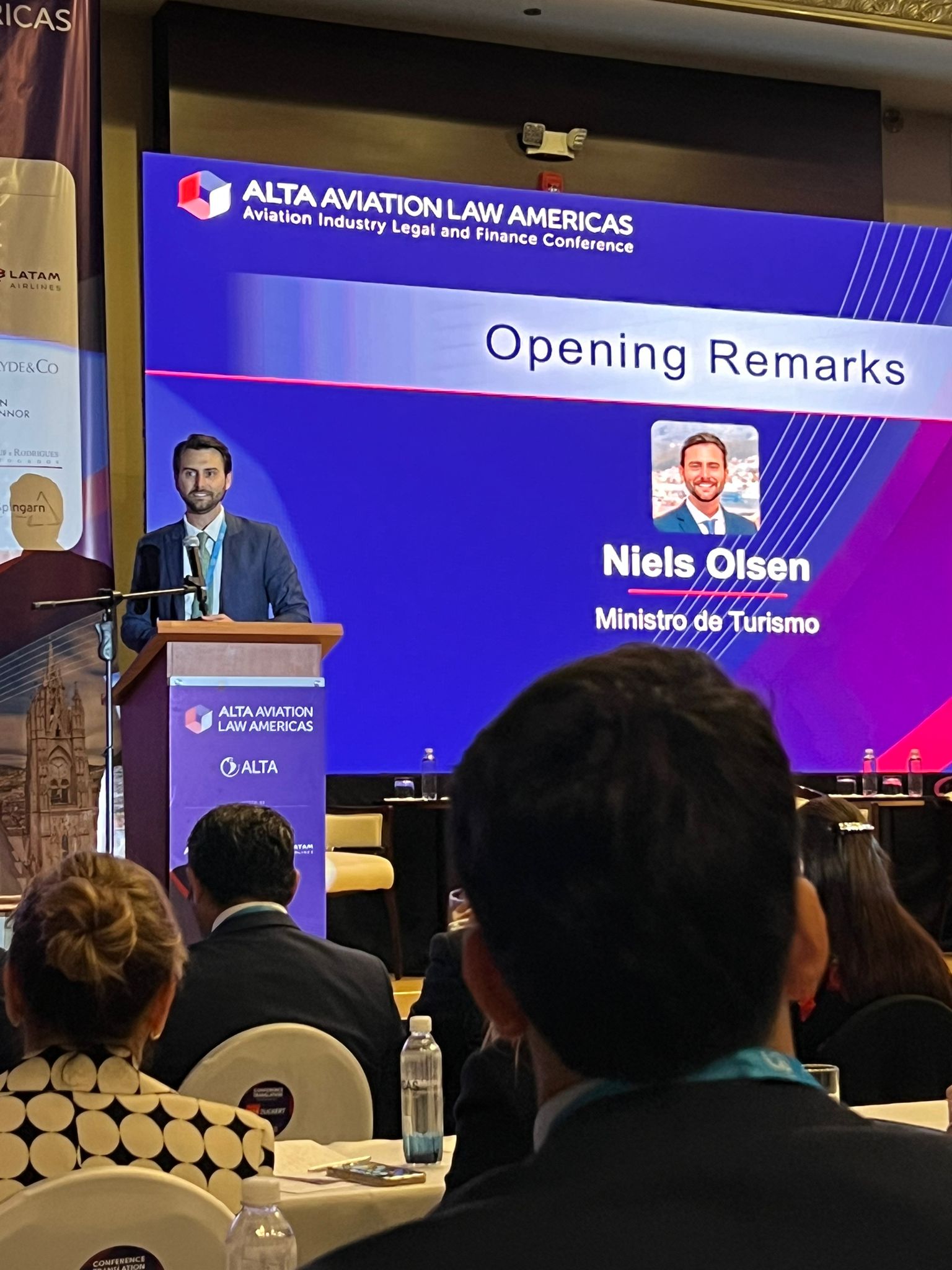Ecuador's aviation figures take off: over 8 million passengers may arrive this year
Ecuador is an example of how the promotion of aviation infrastructure contributes: meeting commitments and making changes in legislation and necessary taxes leads to improved connectivity and growth.
September 21, 2023

Quito, September 21, 2023 - This is a historic moment for the aviation industry in Ecuador. This year, the country estimates to receive over 8 million passengers by air. "That figure is the result of the nation's work, which, in recent years, has been working more and more with the industry and, consequently, while in 2000 61% of international tourists arrived by air, in 2023 this figure will be around 90%," noted José Ricardo Botelho, Executive Director & CEO of the Latin American and Caribbean Air Transport Association (ALTA), during the opening of the ALTA Aviation Law Americas 2023.
The measures taken by Ecuador have been important. "We eliminated the Tax on the Exit of Foreign Currency (ISD) charge to airlines, reduced the Eco Delta and Potencia Turística contribution rates and achieved the signing of Open Skies agreements with the United States, Panama, Chile and Dominican Republic," said Niels Olsen, Minister of Tourism.
"Today with pleasure I could say that we have fulfilled one of the main commitments of our administration: the recovery of international air connectivity, which as of this month reached 96%, compared to March 2020", Olsen added, stressing that the country wants to continue growing, so "we welcome you, our strategic partners in air transport in the Americas, to exchange views on aeropolitical matters, legal and financial challenges and best practices facing the aviation industry in the region, within the framework of the ALTA Aviation Law Americas 2023 conference.
"The historic changes made in Ecuador enabled aviation to respond to its vote of confidence: more flights, more connectivity, less expensive tickets and so many other benefits have already arrived. Although the measure has only been in place for a couple of months, positive results are already beginning to be seen. August 2023 was the month with the highest record of international passengers historically in Ecuador reaching 444,479 passengers. And according to published itineraries, December 2023 will be the month with the highest offer of international seats historically in Ecuador, with 530,441 seats offered To/From the country," said Botelho during the event's opening ceremony.
Public policies bringing results
Today, Ecuador is an example of how the promotion of aviation infrastructure contributes: meeting commitments and making changes in legislation and necessary taxes leads to improved connectivity and growth. In this sense, Alex Moreno, Business Development Director of Corporación Quiport, looks back: "23 years ago the infrastructure in the country was deficient. The first concessions began and today there is a framework of mutual confidence with authorities, stakeholders, and airlines. We hope that there will be many more public-private partnerships because we believe that this is the best way for the know-how to arrive, for the airlines to arrive," said the expert during the first panel of the conference's academic agenda.
Mateo Estrella, Advisor to the Ministry of Tourism of Ecuador, also participated in the panel moderated by Viviana Martin, Director Government Relations of Avianca. Estrella highlighted the efforts made by the government to boost the air connectivity in the country. "The mandate of the Ministry of Tourism was to focus on facilitating the presence of air transport in Ecuador. Especially for two reasons: we were overcoming the pandemic that severely affected the tourism sector and also 90% of our visitors arrive by air. 600 thousand families in the country live from tourism and it is the third source of income for Ecuador".
The advisor highlighted that so far this year the country has received 29% more international visitors vs. 2022, "the sector's sales have grown 15%, exceeding 3.5 million dollars. Tourism is a powerful tool for social development," he said.
Meanwhile, Pablo Galindo, Deputy Secretary of Air Transport of Ecuador, said: "It has been a priority for the airlines to see the government as a strategic partner. A single team between authorities, airports and stakeholders working collaboratively. Aviation is a dynamic market moving very fast. That is why we must have a regulatory framework that provides guarantees and is up to date. For the next government we are leaving a guideline, a path laid out so that they can continue working on this matter. We will soon launch a regulatory instrument developed by consensus and updated based on the reality of air transport not only in Ecuador but also in the region and the world."
Oswaldo Ramos, Deputy Director General of Civil Aviation (DGAC), attests to how the policies implemented have had results: "We have seen a 12% increase in domestic flights and 6% in international flights. These are revenues for the country, which stay in the country and this is good news. It reflects the work of everyone involved."
However, Mariela Anchundia, Legal Manager of LATAM Airlines, states that there is still a long way to go. "Quito has a top airport. It is one of the best 40 airports in the world, as evidenced by customer satisfaction surveys. But it is also one of the most expensive airports in the region. We have to continue working in a coordinated manner to see how we can be more competitive. When there is coordination and will, it is achieved. A good example is Cartagena, which used to be one of the most expensive airports, but there was an effort to make the service more accessible and the fees went down from 92 to 38 dollars".
This is exactly the work and the discussion that ALTA promotes: "As we all know; air regulation is a complex body where multilateral instances interact. ALTA promotes the approach of the institutional sectors, the airlines and the authorities so that, along with the specialized bodies in the sector, we manage to create consensus that will not only boost aviation but also our economies", explains Botelho, who is confident that this trend of openness of the government of Ecuador will be sustained, which will result in more international tourists arriving to this country every year.


